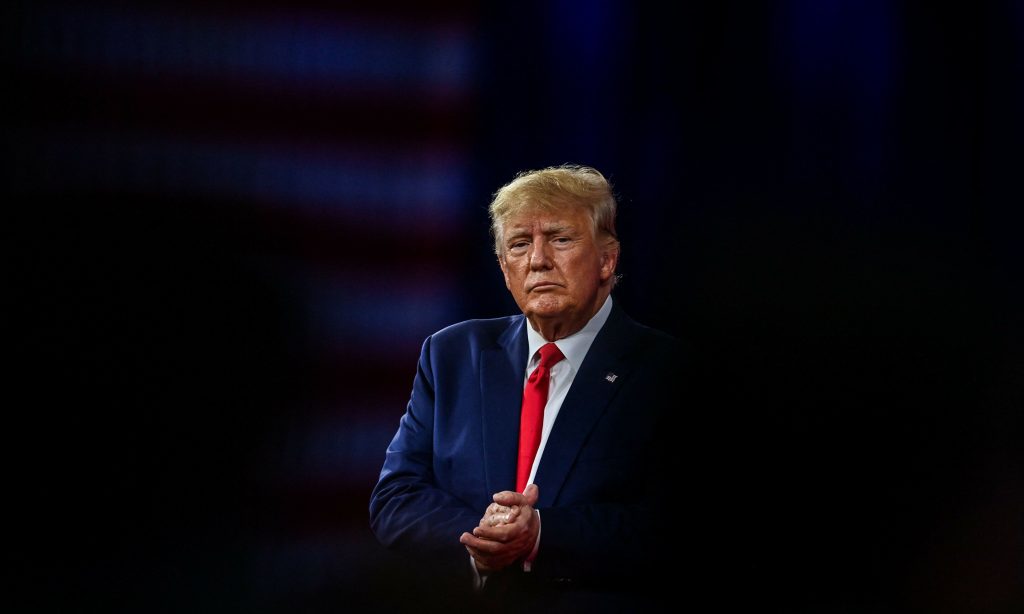Washington: The Supreme Court Thursday will hear former President Donald Trump’s appeal to remain on the 2024 ballot, the justices’ most consequential election case since Bush v. Gore in 2000.
The court will be weighing arguments over whether Trump is disqualified from reclaiming the White House because of his efforts to undo his loss in the 2020 election, ending with the January 6, 2021, attack on the US Capitol.
The case marks the first time the justices will be considering a constitutional provision that was adopted after the Civil War to prevent former officeholders who “engaged in insurrection” from holding office again.
It sets up precisely the kind of case that the court likes to avoid, one in which it is the final arbiter of a political dispute.
The Colorado Supreme Court ruled that Trump incited the riot in the nation’s capital and is ineligible to be president again. As a result, he should not be on the ballot for the state’s primary March 5, the court ruled. It was the first time that Section 3 of the 14th Amendment was applied to a presidential candidate.
Trump’s lawyers argue that the amendment can’t be used to keep Trump off the ballot for several reasons.
For one thing, they contend the January 6 riot wasn’t an insurrection, and even if it was, Trump did not participate. The wording of the amendment also excludes the presidency and candidates running for president, they say. Even if they’re wrong about all of that, they argue that Congress must pass legislation to reinvigorate Section 3.
The lawyers for Republican and independent voters who sued to remove Trump’s name from the Colorado ballot counter that there is ample evidence that the events of January 6 constituted an insurrection and that Trump incited it. They say it would be absurd to apply Section 3 to everything but the presidency or that Trump is somehow exempt. And the provision needs no enabling legislation, they argue.
A definitive ruling for Trump would largely end efforts in Colorado, Maine and elsewhere to prevent his name from appearing on the ballot.
A decision upholding the Colorado decision would amount to a declaration from the Supreme Court that Trump did engage in insurrection and is barred by the 14th Amendment from holding office again. That would allow states to keep him off the ballot and imperil his campaign.
The justices could opt for a less conclusive outcome, but with the knowledge that the issue could return to them, perhaps after the general election in November and in the midst of a full-blown constitutional crisis.
Trump is separately appealing to state court a ruling by Maine’s Democratic secretary of state, Shenna Bellows, that he was ineligible to appear on that state’s ballot over his role in the Capitol attack. Both the Colorado Supreme Court and the Maine secretary of state’s rulings are on hold until the appeals play out.
The court has signalled it will try to act quickly, dramatically shortening the period in which it receives written briefing and holds arguments in the courtroom.
People began lining up outside the court on Wednesday hoping to snag one of the few seats allotted to the public. “This is a landmark decision and I want to be in the room where it happened, to quote Hamilton,’” said Susan Acker of Cincinnati, Ohio, who was in line with two friends.
The issues may be novel, but Trump is no stranger to the justices, three of whom Trump appointed when he was president. They have considered many Trump-related cases in recent years, declining to embrace his claims of fraud in the 2020 election and refusing to shield tax records from Congress and prosecutors in New York.
Before the Supreme Court is even finished deciding this case, the justices almost certainly will be dealing with another appeal from Trump, who is expected to seek an emergency order to keep his election subversion trial on hold so he can appeal lower-court rulings that he is not immune from criminal charges.
In April, the court also will hear an appeal from one of the more than 1,200 people charged in the Capitol riot. The case could upend a charge prosecutors have brought against more than 300 people, including Trump.
The court last played so central a role in presidential politics in its 5-4 decision that effectively ended the disputed 2000 election in favour of George W. Bush.
Justice Clarence Thomas is the only member of the court who also took part in Bush v. Gore. Thomas has ignored calls by some Democratic lawmakers to step aside from the case because his wife, Ginni, supported Trump’s effort to overturn the 2020 election results and attended the rally that preceded the storming of the Capitol by Trump supporters.
